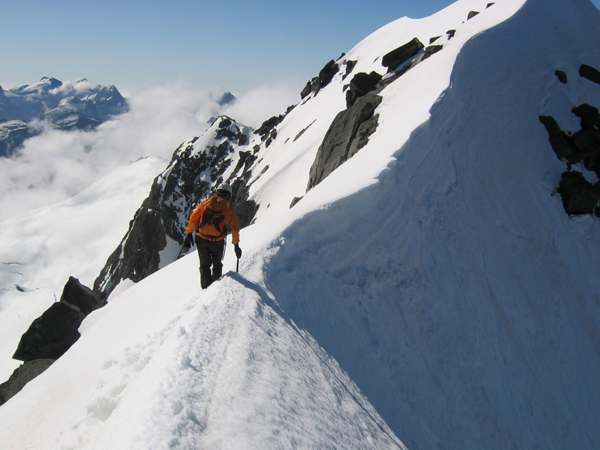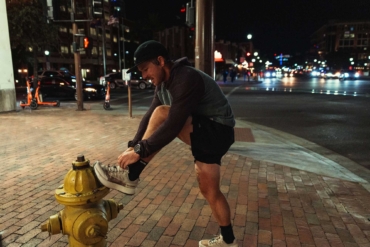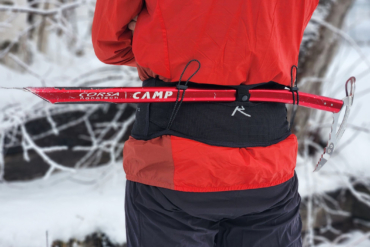
How much do you train, and could you get better results with less effort? What about just three hours a week?
Craziness or a dream come true for busy athletes, a new book by adventurer Andy Magness theorizes that super short, intense workouts can prepare athletes for long endurance events.
UltraMental is a guide to training that uses current research and personal experience to support and explain the less-is-more theory.
We got in touch with Magness to learn more about his three-hours-per-week training for ultra-marathon (and longer) events around the world.

GearJunkie: Why did you decide to write a book on this topic?
Andy Magness: UltraMental is the bringing together of all my training ideas and philosophy and practice over the past half-decade. As I began training less and harder and yet still doing really big things, I started to connect with other people doing the same and found there weren’t any books on the topic. Those I told about my experiment typically thought it was crazy and would end in failure. But with continued success I kept thinking about things, doing research on various elements of the training, and piecing together a reasonable explanation as to why I became faster and more capable.
Who should read this book?
Everyone who aspires to do big endurance races or is fascinated by those who do them. Anyone who’s got the Ironman or an ultra on their bucket list but doesn’t know how they are going to manage. Someone who wants to figure out how to train for endurance as efficiently as possible — getting the most out of each minute. Mike Mentzer fans.
Explain the book’s name.
It’s two-part, one stressing the “mental” part because this training is 90% mental, as opposed to physical. And then the name is a nod at “mental” meaning crazy, as that’s what conventional wisdom thinks of my ideas.
How much of training is physical, and how much is mental?
The training I ascribe to and promote, “High Intensity Interval Training” I call it, carries with it a huge mental load. While it is physically very demanding, it is short and allows for adequate recovery. I have been injury-free despite an average of a half-dozen big events a year since 2007. But HIIT training, done consistently, is mentally very difficult. In the book I lay out a way to deal with the mental side so that it can be used, if desired, almost exclusively as a road to an adequate level of fitness for ultra-endurance racing.

Same for racing and expeditions… how much is physical, and how much is mental?
The longer the race the more the balance shifts towards mental. Short races push you closer to your actual physical potential. Multi-day adventure races are a matter of mentally overcoming barriers and low points or physical collapses because they are going to happen.
How does Eric Collard fit into this book?
Eric was the motivating force for the book to begin with. He became intrigued by my ideas after reading an article i wrote for Breathe Magazine. Then we met when he came down to do a 50K winter ultra that I put on outside of Fargo. He pushed me to collect my ideas and served as a sounding board and mentor and taskmaster throughout the process of writing a book, which was all new to me.
Do you take any influence from Tim Ferriss’ “The 4 Hour Body”?
I didn’t read the book but did realize after its success that maybe there was an audience for my ideas, and I like Tim’s spirit and confidence in himself, in spite of what others might say. I joke that my ideas are like Ferriss’s, only much bolder, and I’ve actually used my ideas to run an ultra-marathon (there was some contention with his 5K to 50K chapter and how he was ‘going to’ run an ultra when the book went to press but never did). I waited until I’d run several before publishing.
Is the book meant for serious athletes only?
I believe that the lessons and ideas in the book are applicable to a wide range of athletes. HIIT is very hard when done properly and will be unappealing to most when done exclusively as I do it, but even once a week application of higher intensity work can be beneficial. The chapters on mental aspects of training and racing also apply across the board to both elite and recreational athletes taking on ultra-distance events.
Can someone “off-the-couch” benefit from this book and your training advice?
For me it comes down to intensity. Most training programs seem to focus on volume primarily. The ideas of baseline workouts and consistent use of them in designing a program almost ensures continuing progression along the fitness spectrum to those able to carry them out. I believe that the principles in the book could be adapted for use by ‘off the couch’ folks who aspired to do bigger things.
Give us three or fours tips to better training that people learn about in this book?
There are LOADS of tips and guidelines for efficient training and tricks for developing the mental ability to take on high intensity work. Naming only three or four is going to be a challenge, but…
1) Use baseline workouts regularly to make sure you keep progressing toward your goal.
2) Use of objective metrics (pace, wattage, RPM) as opposed to subjective ones (perceived exertion) is critical for high-intensity work.
3) Confidence is key. You can still fail despite confidence, but without it you will fail.
4) Racing is training and will add to your ability to progress confidently into longer distance events and bigger efforts.
5) If you’re not failing to meet your workout goals once in a while, you’re not working hard enough!

Give us some mental tips.
1) Break it down. This works for both short and long efforts — in short intense intervals, forget about future intervals that seem impossible. Focus on the interval you are doing — those next 30 seconds. Every successful interval will bolster your confidence and make the next one more likely.
2) Don’t rely on other people’s sense of what is possible to determine your own ideas of possibility. Decide for yourself.
3) Lie to yourself — if you tell white lies (I’ll quit at mile 50, or after the fourth of six intervals) you can eek a little more tolerance out of your central governor. But then at mile 50 or interval 4, renegotiate. After all, you’re halfway or only two intervals from the end!
4) There is a story in the book about a friend of mine doing a 12-hour bike race and coming into the transition after 10 laps declaring he was done…. I told him about digging holes… great story in the mental chapter. Worth reading.
Did you have an epiphany moment about how/why this kind of training works?
It was a slow process. To begin with, it just worked. In order to seek balance in my life I arbitrarily limited my training. But I kept doing big races occasionally. I got stronger and faster with less time invested. So i started (naturally, i’m a scientist by education!) trying to figure out why (it flew in the face of most conventional training wisdom). My hypothesis, if you will, has been cobbled together over the last five years as I’ve had the time to do research on various aspects of training, both physical and mental.
How did you used to train (before implementing the three hours a week)?
Leading up to my participation in Primal Quest 2006, I trained three days a week for an hour to two each session and then put in big sessions on the weekend of many hours (8-12 or more). For my off-road Ironman in 2003 I trained more traditionally as well, with longer runs and bikes and zero high intensity work. I was probably training 10-20 hours a week for that race.
What kind of base fitness level did you have when you started on this regimen?
I imagine I had pretty good base fitness when I started. But what was amazing is how much stronger I got right away. Although I’d run marathons before, I struggled to run faster than 8 minute miles. My fastest half was a 1:47.
Does a reader need to have a lot of base fitness to be able to gain from the book’s advice?
I discuss specific concerns for new athletes in both the physical and mental chapters. But no, I think the principals and schemes are more dependent on someone’s mental capacity to perform (and enjoy) true high intensity work than on their physical starting point. And I also think that the advice can be scaled back—intensity is relative—someone with less fitness can still work at 90% of their max for 5 minutes the same as I can. They just might not have run or biked as far.
What one thing should a reader take away — what is the most important piece of knowledge or advice that could change someone?
Decide for yourself. Don’t decide to do something or not to do something based on what others have decided is the right way to proceed. I’ve had so many people tell me that I will fail or simply won’t be able to do such and such race on my training. But it is far more important what I think than what they say. Confidence! That and the idea that failure is ok — wanna try an ultra marathon but don’t have the time to put in 50 mile weeks? Do what you can and go for it. You can’t succeed if you don’t try, and failure is always a possibility with any risk worth taking. You’ll learn either way.






